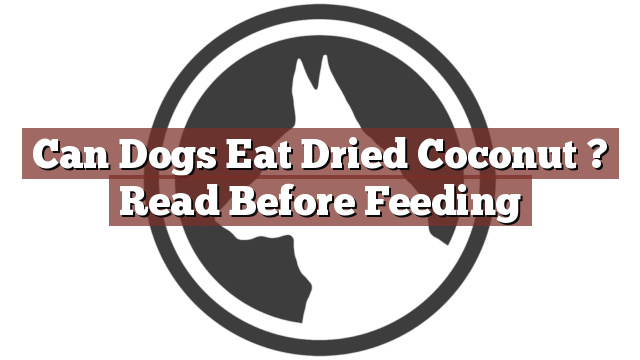Understanding Your Dog’s Dietary Needs
As a responsible dog owner, it is crucial to understand your furry friend’s dietary needs. Dogs require a balanced diet that includes proteins, carbohydrates, fats, vitamins, and minerals. While their primary source of nutrition should come from high-quality dog food, some fruits and vegetables can be a healthy addition to their diet. However, it is essential to be cautious about what human foods you offer them, as some can be harmful or even toxic to dogs.
Can Dogs Eat Dried Coconut? Read Before Feeding
Can dogs eat dried coconut? This is a common question among dog owners who are curious about what human foods they can share with their pets. The answer is yes, dogs can eat dried coconut in moderation. However, there are a few important factors to consider before including it in their diet.
Coconut itself is safe for dogs to consume, but moderation is key. Dried coconut, in particular, should be given in small quantities due to its high-fat content. Fats are an essential part of a dog’s diet, but excessive consumption can lead to weight gain or digestive issues. It is always recommended to consult with your veterinarian before introducing any new food to your dog’s diet, including dried coconut.
Pros and Cons of Feeding Dried Coconut to Dogs
While dried coconut can be a tasty treat for your dog, it is essential to weigh its pros and cons before incorporating it into their diet.
Pros:
-
Rich in nutrients: Dried coconut is a good source of fiber, healthy fats, and minerals such as manganese and copper. These nutrients can contribute to your dog’s overall health and well-being.
-
Promotes skin and coat health: The healthy fats found in dried coconut can help improve your dog’s skin and coat condition, reducing dandruff and itchiness.
Cons:
-
High in calories: Dried coconut is calorie-dense, so excessive consumption can lead to weight gain in dogs. This is especially important to consider if your dog is already overweight or prone to obesity.
-
Digestive issues: Due to its high-fat content, feeding too much dried coconut to your dog can cause digestive upset, including diarrhea or pancreatitis.
Conclusion: Make an Informed Decision for Your Furry Friend
In conclusion, the answer to the question "Can dogs eat dried coconut?" is yes, but it should be given in moderation. While dried coconut can provide some health benefits for your dog, such as promoting a healthy coat and skin, it is crucial to be aware of its high-fat and calorie content. If you decide to incorporate dried coconut into your dog’s diet, start with small portions and observe how your dog reacts to it. Remember, every dog is unique, and consulting with your veterinarian is always recommended to ensure your furry friend’s dietary needs are met.
Thank you for taking the time to read through our exploration of [page_title]. As every dog lover knows, our furry friends have unique dietary needs and responses, often varying from one canine to another. This is why it's paramount to approach any changes in their diet with caution and knowledge.
Before introducing any new treats or making alterations to your dog's diet based on our insights, it's crucial to consult with a veterinarian about [page_title]. Their expertise ensures that the choices you make are well-suited to your particular pet's health and well-being.
Even seemingly harmless foods can sometimes lead to allergic reactions or digestive issues, which is why monitoring your dog after introducing any new food item is essential.
The content provided here on [page_title] is crafted with care, thorough research, and a genuine love for dogs. Nevertheless, it serves as a general guideline and should not be considered a substitute for professional veterinary advice.
Always prioritize the expert insights of your veterinarian, and remember that the health and happiness of your furry companion come first.
May your journey with your pet continue to be filled with joy, love, and safe culinary adventures. Happy reading, and even happier snacking for your canine friend!

